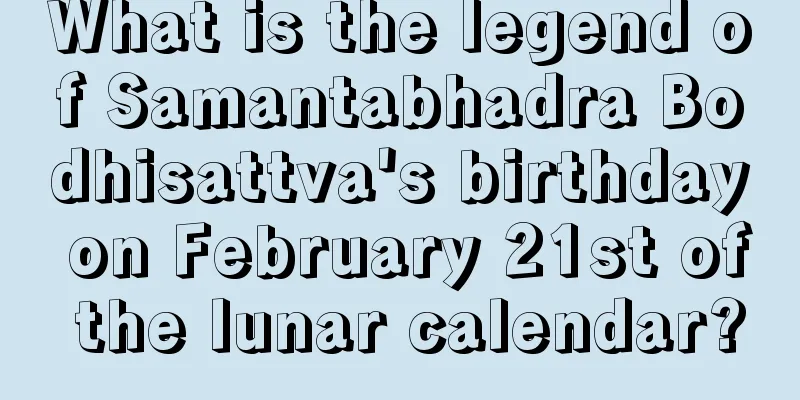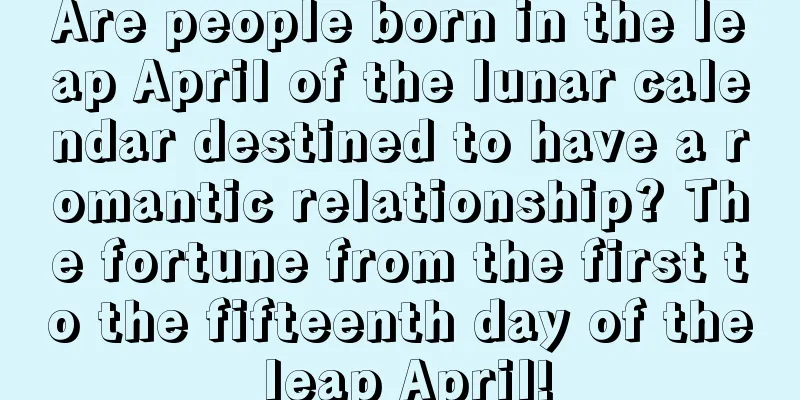What is the legend of Samantabhadra Bodhisattva's birthday on February 21st of the lunar calendar?

Introduction: The atmosphere of the Spring Festival has just passed, and I believe everyone has returned to their normal work! After the first month of the year, we enter the second month of the lunar calendar. I believe everyone knows some important festivals in February. So what special days are there at the end of February? Is February 21st the birthday of Samantabhadra Bodhisattva? What legends are there about Samantabhadra Bodhisattva? Let’s take a look together. Mr. Shui Mo summarizes many festivals and solar terms in the second month of the lunar calendar to help people better know how to face every day in February. February 21st of the lunar calendar is the birthday of Samantabhadra Bodhisattva. People can pray, burn incense at home or go to the temple to burn incense. Samantabhadra Bodhisattva is the Bodhisattva who symbolizes the virtue of reason and the virtue of practice, corresponding to the wisdom virtue and the righteous virtue of Manjushri Bodhisattva. He is the right and left attendants of Sakyamuni Buddha in the Saha world, and is known as the "Three Holy Ones of Avatamsaka Sutra".Legend of Samantabhadra Bodhisattva:Samantabhadra Bodhisattva has infinite vows and has split himself into many bodies across the world to teach and enlighten sentient beings according to circumstances. According to historical records: The ancient Chinese Buddhist master Shi De was the incarnation of Samantabhadra Bodhisattva.Zen Master Fenggan of Guoqing Temple in Tiantai Mountain was passing by the Chicheng Road one day when he heard a child crying in the bushes. He went forward to check and saw a child about ten years old. When he asked the child's name, the child replied, "I have no home, no surname, and no name." Zen Master Fenggan felt sorry for the child and took him back to Guoqing Temple and assigned him to the storehouse as a tea boy. Because it was picked up, it was named "Shi De". Because Shi De was smart and clever, he was promoted to the position of incense and lamp in the dining hall three years later, and was in charge of miscellaneous tasks such as serving food. One day, when he saw no one around, he actually sat on the seat and ate opposite the holy statue, and even scolded the statue for its small fruits and burnt buds and rotten seeds. This was seen by Zen Master Zhiku Lingyi, who blamed him for being disrespectful to the holy images and suspected that he had a mental problem. He dismissed him from his position as incense burner and sent him to the kitchen to wash dishes. He often put the leftover food in a bamboo tube and gave it to his close friend Hanshan. Once, the food, flowers and fruits in the temple were pecked by birds. Shi De took a stick and hit the mountain god statue enshrined in the temple, blaming it for not guarding the temple well, failing in its duty, and accepting the offerings from the monks in vain. That night, all the monks in the temple dreamed that the mountain god said, "Shi De hit me and scolded me." Zen Master Lingyi went to the mountain god statue to inspect it. He saw traces of being beaten with a stick on the statue. Only then did he realize that Shi De had an extraordinary origin. Shi De often interacted with Han Shan and often talked about Buddhism to others. But people did not believe him. Instead, they ridiculed and cursed him, and even beat him. Hanshan said to Shiti: "How should I treat those who insult me, bully me, humiliate me, laugh at me, look down on me, despise me, hate me, and cheat me?" Shiti replied: "Then I can only tolerate him, let him be, avoid him, endure him, respect him, and ignore him. In a few years, you will see what happens to him." Later he was appointed to be in charge of herding cattle. One day, it was the half-month Buddhist retreat in the temple and the lawyer was giving precepts to the monks in the hall. Shi De drove the herd of cattle to the front of the Dharma Hall, where he stood leaning against the door, clapping his hands and laughing, saying, "How leisurely! The herds are gathered together. How about this?" The monk Shuo Jie blamed him for his disrespect and angrily scolded him, "You are crazy. You have broken my precepts." Seeing that Shi De was getting angry, he recited a verse, "No anger is the precept, a pure mind is to leave home. My nature is the same as yours, and there is no difference in all dharmas." Seeing that Shi De was smiling, the monk was so angry that he came down from the hall to beat Shi De and asked him to drive the cattle out. Shi De said, "I won't drive the cows anymore. These cows are all monks who were in charge of affairs in our great life. They all have Dharma names. If you don't believe me, just wait and see. I will call them out." Then he said to the cows, "Hong Jing, the lawyer in our previous life, please stand up." Immediately a white cow made a sound and passed by. Then he said, "Guang Chua, the abbot in our previous life, please come out," and a black cow came out in response. Shi De called out again, "Zhi Sui Jing Ben, come out," and another bull came out in response. Finally, Shi De led the bull and said, "In your previous life, you did not keep the precepts. You have a human face but an animal's heart. You deserve this blame. Who do you blame? Although the Buddha's power is great, you have failed to live up to his kindness." From then on, the monks realized that Shi De was not an ordinary person and no longer regarded him as a madman. Later, Zen Master Fenggan, who was the incarnation of Amitabha Buddha, told the prefect Qiu that Hanshan and Shiti were the incarnations of Manjusri and Samantabhadra. His holy signs were revealed, and he left Guoqing Temple with Hanshan, and their whereabouts were unknown afterwards. Summary: After reading the above legend about the birthday of Samantabhadra Bodhisattva on February 21st of the lunar calendar, everyone can pray and burn incense on this day in the future! I hope you all like this article! You have finished reading this article. For more exciting content, please check out the special topic of the second month of the lunar calendar! |
<<: The first day of the second lunar month is Zhonghe Festival. What are the customs and cultures?
Recommend
The fate of girls born on February 13th of the lunar calendar in 2021
The destinies of different children are also diffe...
Is the 28th day of the eighth lunar month in 2020 a good day according to the lunar calendar?
The eighth month of the lunar calendar is Mid-Aut...
Is there 30 days in the twelfth lunar month of the Year of the Rat in 2020? Is New Year's Eve in the twelfth lunar month?
Introduction: The number of days in each lunar mon...
Fate analysis of the 12 zodiac signs born during the Lesser Heat, fate analysis of the Lesser Heat solar term!
Introduction: People born in different solar terms...
Is New Year's Day on January 1, 2019 suitable for ancestor worship? Is New Year's Day a suitable day for ancestor worship?
Introduction: Ancestor worship is a major event, a...
Is the first day of the sixth lunar month in 2019 suitable for offering sacrifices? What are the particulars of offering sacrifices?
Introduction: Visiting graves to worship ancestors...
Is the 29th day of the sixth lunar month in 2018 a suitable day for signing a contract? When is the auspicious time of the day?
Is the 29th day of the sixth lunar month in 2018 a...
Is February 11th of the lunar calendar in 2018 not suitable for signing contracts?
Introduction: The lunar calendar is different ever...
Folk Feng Shui story: An introduction to how Lu Meng defeated Guan Yu!
Lu Meng and Guan Yu are both more famous figures i...
Is the sixth day of the third lunar month in 2021 an auspicious day? Is it okay to travel that day?
In our country, people like to look at the almanac...
How will the fortune of people born in the Year of the Rooster be after the Beginning of Autumn in 2022?
The arrival of a new solar term will also bring ne...
Is it a good time to move into a new house on the Autumnal Equinox, August 25, 2019 in the lunar calendar? Things to note when moving on the Autumnal Equinox!
Introduction: Moving into a new house is also an i...
Is it okay for a baby to be born on the 13th day of the first lunar month in 2021? What kind of personality does the child have?
If 2021 is a brand new chapter, then the first mon...
What is the date and day of March 11th in the lunar calendar in 2018?
In March, all things come back to life, willows a...
Is the fourth day of the fifth lunar month in 2018 an auspicious day in the lunar calendar?
Introduction: Every day not only unfolds in differ...









